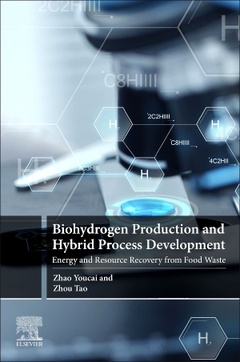Description
Biohydrogen Production and Hybrid Process Development
Energy and Resource Recovery from Food Waste
Authors: Youcai Zhao, Tao Zhou
Language: English
Subject for Biohydrogen Production and Hybrid Process Development:
Keywords
?A pilot-scale study; Acid and alkali pretreatment; Aged refuse; Aged refuse and alkali addition; Aged refuse and laundry detergent addition; Anaerobic fermentation; Anaerobic fermentation process; Bacteria; Biodynamic property; Biohydrogen and biomethane; Biohydrogen production; Biohydrogen production anaerobic fermentation; Biomethane fermentation of biohydrogen residue; CaCO3/MnCl2/NaCl addition; Combined anaerobic fermentation; Composite hydrogels fertilizers; Continuous biohydrogen-production fermentation; Continuous stirred tank reactor (CSTR); Design; Design and construction of anaerobic reactor; Design and operation management of food waste treatment plant; Digestion; Fe and nitrogen source addition; Food waste; Functionalized stereoscopic porous activated carbon; Heat pretreatment; Heavy metals; Humic acid recovery; Inhibitor; Inoculation sludge; Joint operation; Landfill leachate; Mature landfill leachate; Mechanism analysis; Medium and high temperature pretreatment; Nutrition recovery from food waste; Optimization of biohydrogen production; Organic waste; Overall structure; PCR–DGGE characterization of microbial populations; Particle sludge; Principle of biohydrogen production; Push-flow reactor; Remediation of contaminated soil; Response surface optimization; SPAC-NH2 adsorbent; Satisfaction function; Semicontinuous anaerobic rotary drum (SARD); Simultaneous anaerobic fermentation; Sludge; Sources and characteristics; Working principle and structural parameters
566 p. · 15x22.8 cm · Paperback
Description
/li>Contents
/li>Readership
/li>Biography
/li>Comment
/li>
Biohydrogen Production and Hybrid Process Development: Energy and Resource Recovery from Food Waste explores the production of biohydrogen from food waste via anaerobic fermentation, focusing on effect factors, control methods and optimization. The book introduces food waste treatment and disposal technologies, including operational principles and process control. The authors discuss the use of aged refuse, the effect of several key factors on anaerobic gas production rate, process parameters optimization for enhancing biohydrogen yield, key factors in biohydrogen production from sewage sludge fermentation, and new developments in nutrition recovery from food waste.
This book spans the entire production cycle, from waste recovery to its conversion processes, end-product, and by-product utilization, providing engineering researchers, PhD students, and industry practitioners in the field of biohydrogen production, biogas production, biomass conversion, and food waste management with a thorough background on the production of hydrogen via anaerobic fermentation.
1. Anaerobic Fermentation Process for Biohydrogen Production from Food Waste 2. Optimization of Biohydrogen Production with Additives and Inoculum from Food Waste 3. Pretreatment and Aged Refuse Dosage on Biohydrogen Production from Food Waste 4. Simultaneous Anaerobic Fermentation Biohydrogen and Biomethane Production from Food Waste 5. Combined Anaerobic Fermentation Biohydrogen and Biomethane Production for Sewage Sludge and Food Waste 6. Design and Optimization of Biohydrogen Production Reactor 7. New Development of Nutrition Recovery from Food Waste
Zhou Tao is currently assistant research fellow of environmental engineering at School of Environmental Science and Engineering, Tongji University. He received his bachelor degree in Environmental Engineering from Guangxi University, China in 2014 and his Ph D from Tongji University, China in 2019. He has authored or co-authored 42 peer-reviewed international papers, 15 Chinese papers, and 4 invited book chapters, 2 English book (Elsevier). His principal research interests lie in treatment and resource recovery of municipal and rural as well as industrial solid wastes.
- Covers the fundamentals and applications of the use of food waste for biohydrogen production through anaerobic digestion
- Explores core challenges of biohydrogen production operations, including details on process optimization and control, and multiple case studies grounded in current industrial practice
- Includes methodological perspectives comparing and contrasting approaches to biohydrogen production using anaerobic digestion with optimization techniques for production efficiency
These books may interest you

Advances in Bioenergy 171.65 €



